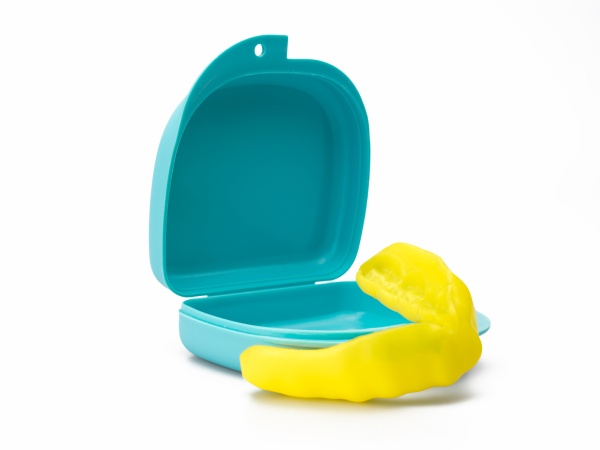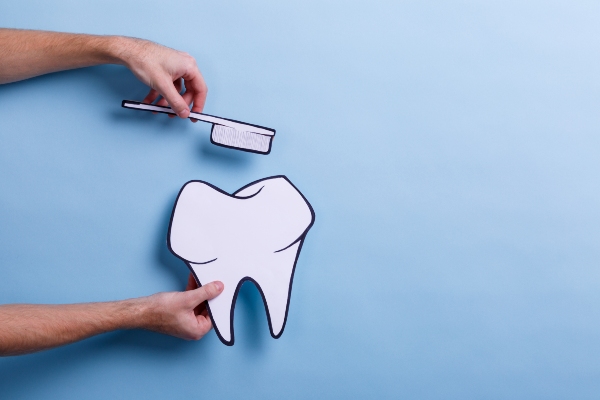What Are Mouth Guards?

Looking for information on mouth guards because you think you might need one? If you grind or clench your teeth, you may need to get a mouth guard to prevent your teeth from becoming damaged. If you participate in sports, wearing a mouth guard will lower your chance of suffering any sport-related dental injuries. According to the American Dental Association, it is important for mouth guards to be safe, but to be effective, they also have to be used.
About mouth guards
Learning more about the types of mouth guards available will help you choose one that is right for you. The three main types include ready-to-wear mouth guards, boil-and-bite mouth guards and custom-made mouth guards. Ready-to-wear mouth guards can be bought over the counter and because they are a one-size-fits-all, this type of mouth guard does not offer many wearers a comfortable fit.
Boil-and-bite mouth guards are also bought over the counter and are placed in boiling water in order to soften the plastic to fit the shape of the mouth. Custom-made mouth guards are made by a dental professional and offer the most protection.
Mouth guard features
When choosing a mouth guard, there are certain features that wearers should look for that will let them know the mouth guard will do its job properly. These features include a comfortable yet tight fit, a thickness of at least 4mm, have no odor or taste, allow for easy breathing, allow for easy swallowing and allow for normal speech. The bottom line is that a mouth guard should properly fit one’s mouth in order for it to work.
Risk factors that require mouth guards
There are some risk factors that are associated with a higher chance of sustaining a dental-related injury. These risk factors include being diagnosed with bruxism, wearing braces, participating in contact sports, having front teeth that stick out and not having enough lip to cover the front teeth.
Types of dental-related sports injuries
Some of the more common types of dental-related sports injuries someone may incur when not wearing a mouth guard include cuts to the lips, gums, cheeks and tongue, chipped teeth, broken teeth, knocked out teeth and a broken jaw.
Caring for mouth guards
The instructions that come with mouth guards should be carefully followed, as this allows them to last for as long as possible. Basic care instructions include rinsing the mouth guard in soapy warm water after it has been used, using mouthwash to kill germs once a week or so, keeping it out of direct sunlight and storing it in a cool, dry and well-ventilated place when not being worn.
Are you currently in need of a mouth guard?
Whether you grind or clench your teeth or participate in contact sports, it is important for you to protect your teeth so they do not become damaged. If you wait too long to get a mouth guard, you may end up with damage to your teeth, which will need dental treatment to correct.
Are you considering mouth guards in the Delray Beach area? Get more information at https://www.palmbeachdentistry.com.
Check out what others are saying about our services on Yelp: Read our Yelp reviews.
Recent Posts
Routine dental care is one of the most important factors contributing to good dental health. While going to the dentist twice a year is the standard rule of thumb, the frequency of the visits ultimately depends on the patient's needs and the recommendation of the dentist. Learn how often routine care should be scheduled and…
Prioritizing routine dental care is necessary for good health. Unfortunately, some people can find it difficult to care properly for their teeth by brushing, flossing, and seeing a dentist on a regular basis. Patients who disregard dental hygiene and professional care need immediate action to prevent dangerous outcomes.In addition to an unsightly smile, failing to…
Many people may believe that they do not have time for routine dental care, which consists of daily brushing and flossing as well as periodic cleaning by a dentist. Admittedly, these tasks do take some time but should be a priority even in a busy schedule. People who do not take time for brushing, flossing,…
Professional dental cleanings are integral for keeping your mouth healthy. They remove plaque and tartar (hardened plaque) that regular brushing and flossing cannot, leaving your teeth and gums refreshed. Maintaining healthy habits that keep your smile bright and strong is essential to make the most of a dental cleaning. Caring for your teeth properly after…


